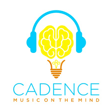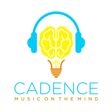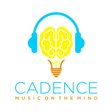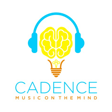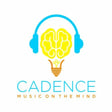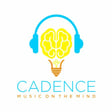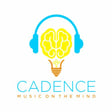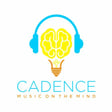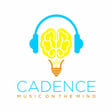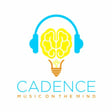Become a Creator today!Start creating today - Share your story with the world!
Start for free
00:00:00
00:00:01

S02 Episode 04: Rewiring Your Brain to Speak, with Music
In this episode we meet Terry. After a devastating car accident he was left with profound damage to his brain’s left hemisphere, significantly impairing his ability to speak. We learn about how—with music—Terry is rewiring his brain and regaining speech.
Transcript
Terry's Recovery Journey Begins
00:00:01
Speaker
Terry certainly started when he awakened from his accident and we were told a completely different thing medically from how things did turn out. And I realized one of his time frames from when he was sitting up to where he could, for instance, the time frame he had to be sitting up and after eating, for instance, and then he could lay back down. And one of his first things that he was zeroing in on was the clock. And I realized, oh my gosh, he's understanding
00:00:30
Speaker
verbiage. And he would then watch the clock for himself. Just phenomenal. And before he got to Craig, it was only thumbs up and thumbs down. But he was able to do that. And so here we are over two years later. He can certainly carry on a conversation.
Introduction to Cadence Podcast
00:00:52
Speaker
Welcome back to Cadence, the podcast where we explore what music can tell us about the mind. I'm Indre Viscontis. I'm a cognitive neuroscientist and an opera singer. And this is my passion project. This season, we're telling the stories of people whose lives have been immeasurably improved by music. And we're asking the question, can music be medicine?
00:01:24
Speaker
In this episode, we meet a patient named Terry, who was in a devastating car accident a couple years ago when he was in his early 20s. The accident left him with profound damage to his left hemisphere, impairing his ability to speak. Rewiring the brain so that speech is possible again is one of the ways in which music therapy has been particularly effective.
Music Therapy's Role in Recovery
00:01:47
Speaker
So in this episode, we're going to hear about music therapy in general and then we'll talk to Terry's music therapist, Sarah Thompson, who's been working with him over the last couple of years to help him regain his ability to speak. And finally, we'll hear from Terry. Terry is rewiring his brain with music.
00:02:06
Speaker
At the top of the episode, we heard from his mother, Susan, describing the journey that he's been on over the last few years. But now let's turn to Peggy Codding, a music therapy professor at the Berkeley College of Music, to help us understand how music therapy can be helpful in these settings and what the goals are for music therapists.
00:02:26
Speaker
Tell me a little bit about your journey into music therapy. What got you thinking about using music as a therapeutic tool and then how you got to where you are? Well, as most music therapists come to music therapy, it is through the music door and sometimes often through an experience that they've had either with a family member or someone who has an ability challenge or through
00:02:54
Speaker
A personal experience, mine was definitely through a personal experience as a young child. As a young child, I lost my family. I lost my parents and was not very vocal as a child. And so someone pushed a piano in front of me and it became really a voice for me and has continued to be that in the most positive of ways.
00:03:18
Speaker
As for many people who experience trauma, and as research tells us as well, trauma is very deep-seated and words very often language in the sense that we know it is not adequate for expression.
00:03:36
Speaker
very often either art or music because it doesn't necessarily rely on words. Music can be a way to find expression and for me it was. I really didn't have language in the sense that we talk about it.
00:03:56
Speaker
I played piano and my teacher was, interestingly enough, a Holocaust survivor, a master teacher and a master pianist. And so we sort of moved through our journey together and it was a beautiful one.
Understanding Music Therapy with Peggy Codding
00:04:13
Speaker
What is the difference between music therapy and say playing music in a hospital setting? Really great question because there are many people who go into the hospital to play for the pleasure and the relaxation of
00:04:29
Speaker
of patients. Music therapists are trained at an undergraduate or at a graduate level to use music clinically to improve quality of life, but in a very directed way. There is a standard of care that begins with
00:04:47
Speaker
assessment of the patient or the client in very specific ways followed by the development of a treatment plan and then development of a treatment protocol that then is implemented and there is assessment and evaluation followed by termination of treatment. That falls more in line with medical standard of care.
00:05:12
Speaker
Or it could also be in an educational setting where, again, the standard of care would involve something similar to that or in community mental health, same kind of thing. The music therapy involves the therapy component as well as the very direct musical training.
00:05:32
Speaker
So I know that some aspects of music therapy can have very measurable results. So say, for example, language acquisition or sort of treatment of specific conditions. But are there other ways in which the sort of quality of life improvements can be measured after music therapy or during music therapy treatment? We, as music therapists, look at
00:05:58
Speaker
the outcomes for music therapists both in observable measurable ways and we're trained in that capacity and also as musicians are aware that some of the outcomes in terms of quality of life are very subjective and the facility where we work
00:06:17
Speaker
and the means of payment sometimes determines how we measure outcomes. For example, insurance companies are very much interested in observable measurable outcomes and yet there are also more qualitative kinds of outcomes as well.
Sarah Thompson's Therapy Approach
00:06:35
Speaker
narrative information or outcomes related to meaning in life. And those are more personal and not necessarily reported to insurance companies.
00:06:51
Speaker
Peggy Codding is an expert in music therapy, and she trains the new generation of music therapists at the Berklee College of Music. But Sarah Thompson is the one who's been working with Terry. Sarah is a music therapist in Colorado. And in particular, she works at Craig Hospital, which is where Terry's rehabilitation began.
00:07:10
Speaker
I'm a board-certified music therapist, and I've been in clinical practice for about 14 years now. And for the past seven and a half years, I've been doing some work at Craig Hospital, which is a top 10 rehabilitation hospital that specializes in working with people who've had either spinal cord injuries, brain injuries, or strokes.
00:07:31
Speaker
And really my job there is to help patients reach their goals. And I know it sounds very broad, but we know a lot about music and we know that there's certain things that music can be really helpful with. So I might be helping someone to rehabilitate their walking. I might be helping a musician
00:07:55
Speaker
with a spinal cord injury figure out how they can return to playing their instrument after getting a spinal cord injury, I might be trying to help someone regain their ability to speak. So there's just a wide range of things that I'm working on, but music is a therapeutic medium.
00:08:12
Speaker
Remember that Terry has a problem producing words, especially if he's a little bit nervous. But that doesn't mean that the rest of his cognitive abilities are as impaired as it seems. He can understand and he could interact. And in fact, if you were with him in a room, you would notice just how active his brain is. Here's Sarah talking to Terry about things he used to do before his accident. Terry, were you working? Yes. Okay. And what else were you doing? Anything? Tools and
00:08:42
Speaker
Were you a mechanic? Yeah. Well, yes and no. Something with tools. Yeah. Okay. And were you, you were living in Colorado? Yeah. Okay. Did you do anything else outside of work? Climbing. Climbing. Rock climbing? Yeah. Cool. And guitars. You played some guitar a little bit. Yeah. A little bit. Yeah. Um,
00:09:10
Speaker
Pool. And... Playing pool, you mean? Yeah. Okay. And... Is that it? Yeah. Okay, cool. Yeah. Sarah, can you tell us a little bit about Terry's condition and what happened? Sure. So Terry was in an accident. Just driving.
00:09:31
Speaker
driving car accident and got a brain injury and then also after that had a stroke.
Challenges of Expressive Aphasia
00:09:40
Speaker
So he kind of got hit with a double whammy. And so what you're kind of hearing, he's just getting a few words out here and I think he's a little nervous so it's worse than usual.
00:09:54
Speaker
But that's the aphasia and the apraxia coming out. So the type of aphasia that Terry has, there's many types, but he's having trouble expressing himself. So expressive aphasia. And then the apraxia is sort of a
00:10:09
Speaker
difficulty with motor planning around words, although that's gotten so much better, Terry. So he had this accident and he ended up at Craig hospital and that's where I met Terry and his sides. Yeah. Yeah. Your right side. Um, boom. Yeah. He had a stroke on the left side of his brain. So the right side.
00:10:31
Speaker
of his body has difficulty moving and his speech therapist thought I could possibly help him. So she and the doctor made the referral and I came in to meet Terry. So it's obvious that Terry still has a long way to go before he can completely recover his speech.
Brain Rewiring Through Music
00:10:49
Speaker
For most of us, especially those of us who are right-handed, speech production is located in the left hemisphere, towards the front of the brain. But language is such a complex thing that we have many regions that we recruit in order to produce and comprehend speech.
00:11:05
Speaker
In patients who have left hemisphere damage, it can be devastating because they lose their ability to speak. And sometimes in these patients, you can start to train the right hemisphere, the analogous regions on the right side of the brain, to take over some of those functions.
00:11:20
Speaker
In particular, there's a fiber tract between the part of the brain in the left hemisphere that lets us comprehend what people are saying and the part of the brain that lets us produce a response. So the comprehension region is called Wernicke's area and the production region is called Broca's area. And joining these two regions is a tract of fibers called the arcuate fasciculus.
00:11:43
Speaker
It turns out that with a particular kind of music therapy, we sometimes see a growth in fibers in the arcuate fasciculus in the right hemisphere, which for most of us who don't have speech localized on the right side, but rather on the left, the arcuate fasciculus on the right is really pretty small. So over time, with therapy, patients like Terry can start to recruit their right hemisphere to take over some of the functions of their damaged left hemisphere.
00:12:12
Speaker
But it's painstaking work, and depending on where the damage is and how extensive it is, it doesn't always work for all patients. Here's Susan, Terry's mom, talking about the journey that he has been taking in order to recover his speech. Again, in those early days of therapy, and for him to be able to utter any other words was just phenomenal. My heart just was soaring.
Music as a Bridge to Speech
00:12:38
Speaker
I still get emotional.
00:12:42
Speaker
Subsequently, fast forward months later, the radio will be on either in Terry's room or he'll turn on the radio in the car. And there he is. He's just singing along. And it's just fabulous what all of a sudden resonates. He's a huge fan of Billy Joel.
00:13:00
Speaker
So that'll be there and boom, here comes the lyrics. And I would say he definitely does get frustrated. We all do. I think one thing initially just being out at a restaurant, indeed, trying to order, quote, fast food for him to have to point, don't have a menu right in front of you. It's all on boards behind. So eventually he got to the point where he would
00:13:30
Speaker
show me the meal number four, for instance, with the number of fingers he was holding up. So it was really just working from there, saying, okay, that's what you were after. Yeah, I had that confirmed, I had to order for him. But then, eventually I realized, oh no, we can use this as a learning tool as well, saying, okay, well, what number is that? And verbalizing. But every day, there are, there are just words that pop up and
00:13:59
Speaker
certainly wasn't expecting. Tell me a little bit what it's like to notice him or, you know, I love this idea of him sort of singing along to the radio. It must tell me what that's like. It's surprising, always surprising because you just never know what's going to resonate with him and his memory. I wanted to get a deeper understanding of how Sarah and Terry work together and how the therapy started out.
00:14:25
Speaker
So left-sided injury and stroke. How long ago did this happen? Two years. Two years. OK. Yeah. So Sarah, you were at the hospital working as a music therapist. Of course, Terry had a speech therapist working with him. Can you tell us a little bit about what the speech therapist was doing and why he or she might have thought that music would be beneficial?
00:14:53
Speaker
Well, I think it's fairly common knowledge that folks with expressive aphasia do quite well with music. So she knew that at that point goals were getting one word out. Do you remember that too? Yeah. Yeah. It was really, you were so frustrated. Yeah.
00:15:10
Speaker
I remember you being really tearful, actually. So we were trying to, in any way that we possibly could, get him to say a single word, because you would just, as is typical with folks with aphasia, you had... I'm trying to remember what your word was at that time. You had sort of one word that was your go-to that you used for everything. Was it okay, probably?
00:15:36
Speaker
Okay, yes, no. That was it. Yeah, those three words were probably it. So we were trying to stimulate, the speech therapist was trying to stimulate speech through, you know, typical speech therapy techniques and she's very creative. So she was trying all kinds of things with you. And she knew that Terry,
00:15:55
Speaker
really liked music. And I think, especially being at a younger age, that can be, I think people tend to think of that being more of a fit because late teens, early twenties tends to be a time where music's very important in our lives and sort of a big part of our identity. So she was thinking of that. She knew it was helpful for aphasia and knew that Terry loved music, had played a little bit of music background, musical background. And so,
00:16:24
Speaker
That's how that came up. You know, Terry, something that I've always wondered about in individuals who have this kind of expressive aphasia, you are obviously aware that there is something that you want to do, but you know, you can't. And even if you only have a few words,
00:16:42
Speaker
You know, did you try to use those words to express meaning beyond them? I mean, I'm kind of thinking sometimes of how the character Hodor in Game of Thrones, if you're familiar with that show, is shown to, he also only has one word and he uses that word. It turns out it's the name that they've given him and that's why they call him Hodor. He uses that word to express different feelings. So,
00:17:07
Speaker
Even though he's only using one word, you can tell whether he's excited or sad or angry or frustrated. Did you ever find yourself using those words in a way to express some kind of emotion that goes beyond just what the word means? Yes, all types of them.
00:17:27
Speaker
The other thing you would say, Terry, I'm remembering is, oh man. Yeah. And so it could be, oh man, or oh man. They're all different ways of saying it. Depending on, yeah, Terry is very expressive with his facial expressions and his tone of voice.
00:17:45
Speaker
In music therapy, we really break down music into various elements of music. And depending on the technique that we're using, different elements become more important. So, for example, with someone who has aphasia and apraxia, we want to try and stimulate
00:18:03
Speaker
Like automatic kind of words so that's why he could say oh man or some of these phrases because they were just automatic to him But but you know words that if we said say, you know chair that was a lot harder because it's not an automatic kind of word so the way that we would do that through music is that
00:18:22
Speaker
we try new songs that are over-learned, so that are songs that Terry knows so well that he doesn't even really have to think about it. It's like the song comes on, you're singing to it without realizing it kind of thing. So for that, the element of familiarity is very, very important. It doesn't really matter what style of music it is, as long as it has words, but the element of familiarity is so important. And so that very first time I met him,
00:18:50
Speaker
I knew that I needed to know, figure out his music preference, right? And it becomes a little tricky when Terry can't tell me all of his music preference. So we did a little bit of, we did some writing. You were doing some reading of single words at that time. So I would write like rock.
00:19:11
Speaker
on a whiteboard or, you know, country. And then through his gestures, his facial expressions, he would help kind of put us into a genre of music. And then from there, it was sort of a similar process to narrow down. And we started actually pulling up recordings of music and one that we pulled just to see, you know, trying to figure out what music he liked because he wasn't able to tell us. So we were pulling up recordings of music and we pulled up ACDC.
00:19:40
Speaker
Right? And we put that on. And so I kind of sang some of it with you and I would prompt you at certain times and you started, that's when you first started to get your first words outside of, you know, yes, no, and oh man. Do you remember that? Yeah.
Melodic Intonation Therapy
00:20:01
Speaker
Yeah. And it was, he had a huge grin on his face because I think there's an element of success there like, Oh, I just accessed words other than the ones I've been stuck on. Am I saying that correctly? Yes. Yeah. So, so ACDC was your first one. Yeah.
00:20:19
Speaker
Some of the words for the song, I think we did, you shook me all night long. And so, for example, the song would be added, you shook me all night long. And then he would only fill in the last word long. So we started with the nice thing about using music for stimulating that.
00:20:40
Speaker
automatic speeches, you can start with having someone fill in the last word of the phrase, like all night and they fill in long. Yeah. And then you kind of back it up from there. So, and then I may be saying, you shook me and you sang all night.
00:20:56
Speaker
all night long. And then he would say all three words and then we kind of expanded out and depends on the person. Some people can sing the whole song right off the bat and that can be pretty dramatic. But but if not, you can also kind of back it out that way. So that was a very cool moment. I remember that. So ACDC seemed to work in terms of getting some of your first words out beyond the few that remain to you after the accident. How else did the music therapy progress?
00:21:25
Speaker
we did a couple of different things. We did stimulating some of those automatic kind of words through songs. And then we also did melodic intonation therapy. So one of the first phrases we did was my name is Terry. So with tapping the left hand and singing the phrases that we wanted you to be able to say,
00:21:53
Speaker
We went through the whole process of doing some of those phrases. Well, let's pause on that for a second and take a deep dive because that seems very different from, say, singing a well-learned, like the ACDC song or Happy Birthday, something that you've sung many, many, many times. That seems like a different process from repeating something that has a melody but that's novel.
00:22:18
Speaker
How do you think that works? Absolutely. Yeah. It is. It is very different. So, and melodic intonation therapy has been around since the 1970s, and I think, yeah, at its core, the basis really is if I can pull from, you know,
00:22:34
Speaker
music perception research is that melody tends to come more from the right hemisphere for folks. And so using, putting a melody towards, but there is a learning process. There's a whole protocol to melodic intonation therapy and it is novel learning. And so they don't get it. Folks don't typically sing it a hundred percent accurately necessarily the first time, the way that they might be more, you remember that? Yeah.
00:23:02
Speaker
And you might be more likely to sing it. A hundred words that are in overlearned songs might come out more accurately. But melodic intonation therapy, there is a process where you're modeling for them. And then especially with folks with apraxia, you want them to watch your mouth because that's very helpful. Yeah, I know. Yeah. So I present the phrase, then Terry and Terry just listens, right? Yeah.
00:23:28
Speaker
So let's just do, you wanna try like a sample of how we did My Name Is Terry? Yeah, please. Okay, so we would start with, I just kind of present it. So I'm holding his left hand and tapping it on his leg. So it starts with, hmm, hmm, hmm, hmm, hmm, hmm, hmm, hmm, hmm, hmm, hmm, hmm, hmm. And then he listens. My name is Terry.
00:23:56
Speaker
My name is Terry. And then he joins me, which obviously he's getting it very quickly because he's beyond this, but we're doing as if it was, you know, a year and a half ago, probably. And then we, I would fade out and we would sort of echo each other. So my name is Terry. My name is Terry. And then we fade that out. Um, try it one more time on your own.
00:24:26
Speaker
My name is Terry. And then we would try to put him in a situation where he had to actually use that phrase. So grab someone from the hallway and say, Hey, this is Kathy. Tell him, tell her your name. And then you would say, Terry Engdahl.
00:24:42
Speaker
Yeah, but my name is Terry Engdahl. There you go. Yeah. Good. So that's kind of the progression that you go through in doing that.
Progress Beyond Basic Phrases
00:24:53
Speaker
And so, Terry, can you tell us, do you use like, do you think about the melody when you're about to say that phrase or does it just become more like speech? Like, do you just just do it and it just works? Speech and I don't know.
00:25:09
Speaker
Do you think about the melody you think? No. You just do it. I don't know. Never thought about it before. Yeah.
00:25:17
Speaker
So Terry, are there things that you want to say on a regular basis that you haven't been able to find the right melody for or that you guys haven't worked on yet? I guess what I'm asking is, how do you pick what phrases you're going to work on in a therapy session? So I think with
00:25:40
Speaker
And this is just my professional clinical opinion. I think with melodic intonation therapy, you're not going to train every phrase that a person's going to use. And for Terry, all the MIT phrases he's gotten so good at, he doesn't really need, I think he's sort of
00:25:57
Speaker
passed it in a way, in the way that its melodic intonation therapy is traditionally thought of. So we, you know, the last time that we worked together in a therapy setting, we weren't using melodic intonation therapy, we were using some other techniques where we were working on more novel phrases. For example, I'd ask you things like,
00:26:19
Speaker
What's your favorite food? And then you would say, my favorite food is... Is it vegetables? Vegetables.
00:26:35
Speaker
Kudos to your mother or father, whoever it was that taught you to eat vegetables. His mother's here in the studio. She's got a big smile because that's one change from my understanding since his accident is that he now hates sweets and loves vegetables.
00:26:54
Speaker
Wow, that is fascinating. I mean, you know, is that do you think that's related to I mean, does do things taste different to you now, Terry? Is that related? Yeah. Yeah. Yeah. How can you tell us a little bit about like, what is sweet taste like versus vegetables? What what's different?
00:27:14
Speaker
Pechables, that's it. That's what you like? Yeah. Well, you like steak, don't you? Yeah. Oh, yeah. And salad. Salads, yeah. I mean, you like, but pretty healthy diet nowadays. You don't like any, because when we would talk about things like that, I might say my favorite foods, chocolate and Terry would go, yeah.
00:27:39
Speaker
I'm sorry, but no. That's really interesting. Terry, what do you find most frustrating now that you, I mean, this might be hard for you to express, but do you still find yourself getting frustrated? Oh, speaking words are difficult.
00:28:08
Speaker
That's it. I mean what what about your Hand yeah, yes, I know you're eating and well working on it
00:28:19
Speaker
So Sarah, I wanted to ask you a little bit about if we can talk just for a couple minutes about the mechanisms in terms of Terry's injury and sort of the brain regions involved.
Neuroplasticity and Recovery
00:28:29
Speaker
Are we looking at music therapy as a method by which we can help rewire the brain and target some of the neuroplasticity? Or are we looking at
00:28:41
Speaker
you know, coming to the problem from a different direction. So for example, maybe language production won't get completely relocated into the right hemisphere, but maybe we can use some aspects of right hemisphere function to get back at, you know, to solve the problem in a different way. Right. So I guess perhaps a little bit of both. So I think initially
00:29:05
Speaker
One of the things that has driven music therapy techniques, I guess you will, is looking at situations where non-musical things are damaged, but music somehow tends to remain intact. So your person with very advanced Alzheimer's, you see this again and again, that they cannot remember the names of their closest loved ones, but if you start singing a familiar song with them, they can sing every word.
00:29:34
Speaker
There's all these, and for example, with aphasia, I've had patients who can literally get one word out speaking, but can sing entire songs. And so these situations where music is left, music is there. So there's an in for us to get in and do some work. And we know now, like for example, with Alzheimer's that some of the areas of the brain that do musical memory are some of the last to deteriorate with dementia and Alzheimer's. So we know,
00:30:04
Speaker
more of the scientific reason why those things happen. For many years, prior to all the neuroscience research, it was just anecdotes. Oh, these are cool anecdotes. Maybe this music's a cool thing, and now we understand more about why it happens. And I think, in general, for rehabilitation context, we're looking at it from a perspective of
00:30:25
Speaker
using what's there, but creating some neuroplasticity. So for example, working with Terry, yes, he was able to get some more words out with music, but what we saw happen is that his words, even words we hadn't practiced, started coming out more, more frequently. So it wasn't just he could only sing words that he had sung in ACDC songs, it was other words were spontaneously coming out. So it seems to be
00:30:52
Speaker
making some reconnections for people because the families will, you know, we only see them in therapy, but we'll talk to families or we'll watch people in the hallways and you will see these other phrases come out that you've never used. So it's not purely a training effect. It also seems to be a neuroplasticity effect.
00:31:13
Speaker
Rhythm is so important for any kind of motor movement and that can include oral motor movements as well. So rhythm, we know from like basic studies of rhythm perception that our muscles and our nerves respond to the use of rhythm and they actually start anticipating when the next beat is coming because rhythm is just an auditory pattern essentially. And I'm talking about basic rhythms. I'm not talking about
00:31:39
Speaker
you know, sixteenth notes and then an eighth note and then a quarter, I'm not talking like that, just a basic beat, quarter note type beat, that our body perceives that and then our body starts to anticipate when the next beat is going to be and that actually creates like a feed forward type of mechanism so our body is primed and ready to move
00:32:00
Speaker
So with, like at Craig Hospital, we have a lot of people who've had brain injuries, who have trouble with initiation of movement, and we use a ton of rhythm with them, and we see just so much success. And I think that's one of the areas where we don't have a lot of clinical research, but we have a lot of basic research, which gives us a hint as to why that might be happening.
00:32:24
Speaker
I asked Susan what it was like to see her son in such a devastating condition and then slowly, slowly begin to rehabilitate. Because after all, rewiring the brain takes a lot of time and a lot of effort on Terry's part. Terry certainly started when he awakened from his accident and we were told a completely different thing medically from how things did turn out.
00:32:50
Speaker
And I realized one of his time frames from when he was sitting up to where he could, for instance, the time frame, he had to be sitting up and after eating, for instance, and then he could lay back down and his one of his first things that he was zeroing in on was the clock. And I realized, oh, my gosh, he's understanding verbiage. And he would then watch the clock for himself. Just phenomenal. And before he got to Craig, it was only thumbs up and thumbs down. But he was able to do that.
00:33:19
Speaker
And so here we are over two years later. He can certainly carry on a conversation if, again, as Sarah pointed out, if he's comfortable with someone or the environment and not under a microscope, not asking, you know, put on the stage, per se. And then my goodness, yes, he can carry on quite a conversation.
00:33:40
Speaker
And Susan or Sarah, either of you feel free to answer this question. But have you ever observed him looking as if he's sort of relieved of frustration when he's singing along to a song that you wouldn't see when he's trying to get words out in speech? Oh, I would definitely say there's always triumph there. He definitely enjoys music in all facets. And if he can sing along, there's great pride in that.
00:34:09
Speaker
One of the things I love about hearing the stories from patients is how much we can all learn about our own behavior from listening to their experiences.
Communication Tips for Aphasia
00:34:17
Speaker
And so I wasn't surprised, but I was also delighted when Susan, Terry's mom, schooled me on how I converse with Terry and how I could do it better.
00:34:29
Speaker
Earlier in your dialogue with Terry, you were asking two persons to a question. So with aphasia individuals, you have to be more specific, asking one question at a time and waiting for that response. Then you can go to the next question. I would say our common societal dialogue is bam, bam, bam.
00:34:51
Speaker
We will enter three different thoughts or three different options within one given statement with aphasia and apraxia. You have to back way off and only address one issue, one question at a time.
00:35:07
Speaker
Like when Terry says yes and no, then you can get a close ended question here, you know, and then you kind of find things out that way. One question at a time. Right. You've gotten very good at that, Susan. Practice. That's amazing what we learn when we have to, right, Terry? Yes. So can we eavesdrop a little bit into a conversation between you, Susan and Terry? Can you can you demonstrate what would have been a better way for me to sort of ask him questions?
00:35:37
Speaker
How are you? Talk to your mom. Oh, gosh. I'm fine today. Thank you. How are you today, Terry? Good. Wonderful. He's stretching now, so are you comfortable? Yes. And later on today, we plan to go see some family. Yes.
Cognitive Rehabilitation Activities
00:35:57
Speaker
Are you looking forward to that? Yes. Do you remember who we are visiting? Manor.
00:36:03
Speaker
And what would that person be to you? Is she an aunt? No. Is she a grandmother? Yes. Yes.
00:36:14
Speaker
So we are going to visit Monner, which is Terry's nickname for his grandmother. See, we still have, what on the agenda today, we still have some therapies to do, don't we? Can you tell me what kind of therapy, what are we doing today? What's going to be... Exercise. Stretching. Stretching, exercise.
00:36:40
Speaker
Stimulus. Stimulation, right. Right. And... What about... Terry, I wonder if you like to talk about building with Legos? Ah, yes. Hard. What are you doing with that? Stuff. I mean...
00:37:02
Speaker
He initially did quite a bit of Lego building sets. I was fascinated to watch him be able to turn page after page after page and do all the correct placement of those bricks. When he referenced hard, he was explaining he likes the most challenging sets at this point.
00:37:23
Speaker
sets that I didn't know existed. I was only familiar with like kid Legos, but there are very, very advanced Lego sets and you have to read all the instructions. And yeah. Yeah. Yeah. Yeah. Do you have a favorite thing that you've built with Legos? Motorcycles. Oh yeah. Darn. Oh, you like working on it. That is one of Terry's goals is to be able to perhaps one day drive, ride a motorcycle. Yeah.
00:37:54
Speaker
But we also know that's very dangerous. I know. Slow. I know. I know. Slow. Yes. Is that how the accident happened? Was it when you were on a motorcycle or was it in a car? No. It was in a car. Car.
Revisiting the Accident and Stroke
00:38:13
Speaker
Yes, he was driving a car. And yes, it was a left frontal lobe brain injury, and then subsequently a severe left hemispheric stroke. Terri and I had talked about possibly singing a song together just to give you a sense of, this is sort of a replay, if you will, about a year ago.
00:38:40
Speaker
we, a little over a year ago, we were asked to sing for like a fundraising event and they asked to sing the national anthem. And if you've worked for, especially for people who knew Terry and worked with him at the phase where he couldn't get one word out and it was really tearful and it was just so cool to see
00:39:03
Speaker
him do that because that's actually a very difficult song to sing. Yeah. It has not only musically, but then it has some tricky words in there. So we had talked about maybe doing some of that for you. Okay. Yeah. Does that work for you? Sounds great. Hum hum hum. Hum hum hum. He's warming up. I'm going to move my microphone a little bit. So let's start.
00:39:31
Speaker
O say can you see, by the dawn's early light,
00:39:42
Speaker
What so proudly we hailed at the twilight's last gleaming? Whose broad stripes and bright stars through the perilous fight,
00:40:06
Speaker
the ramparts we watched were so gallantly streaming and the rocket's red glare the bombs bursting in air gave proof through the night that our flag was still there
00:40:35
Speaker
O say does that star-spangled banner yet wave O'er the land of the free and the home of the brave?
00:41:10
Speaker
The National Anthem is not an easy song to sing, as anyone who has tried to sing it in front of other people knows. And it is remarkable how much of the ability to sing Terry has retained, even as his speech has been devastated. Over time, I hope that he recovers his speech so that even in situations in which he is a little nervous, or when the interviewer doesn't know how to ask the right questions, he can thrive.
Connecting with Cadence Podcast
00:41:36
Speaker
Thank you for joining me for this episode of Cadence. You can find us online at the ensembleproject.com slash cadence at facebook slash cadence podcast and on twitter at cadence podcast. You can also get in touch with us at cadencemind at gmail.com and you can support us at patreon.com slash cadence podcast
00:41:59
Speaker
You can also support us by going to wherever it is that you get your podcasts and leaving us a review. These reviews really help us grow an audience, which is what we need in order to thrive and continue making episodes. Cadence is produced by Adam Isaac and me, Andre Viscontas. I also created and write the show. Additional production help is from Scott Lowry. The music in this episode was provided for us by acclaimed New Zealand composer, Rian Sheehan. Check him out at RianSheehan.com. You can find me on Twitter at Andre Viss.
00:42:29
Speaker
And this season of Cadence is generously supported by the Germanicos Foundation. Join us in a few weeks for our next episode, in which we continue our exploration into what music tells us about the mind.
